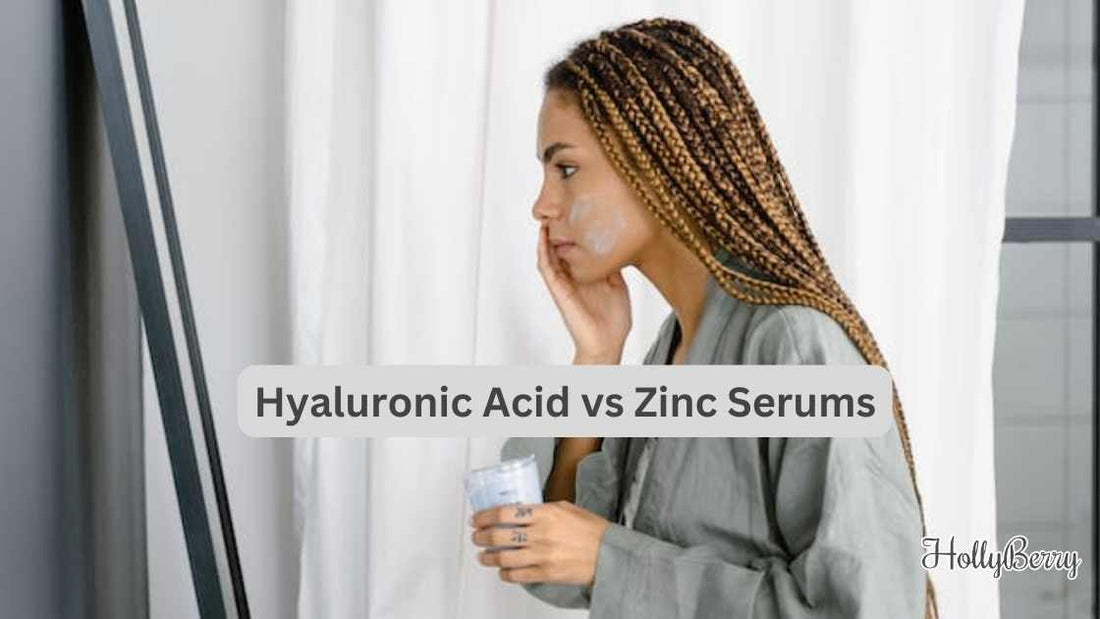
Hyaluronic Acid vs Zinc Serums
Share
Comparing Skincare Benefits

In the realm of skincare, serums have become a cornerstone product for those seeking targeted treatments. Hyaluronic acid and zinc serums serve unique purposes and benefit the skin in different ways.
Hyaluronic acid, a molecule known for its incredible ability to retain moisture, is often included in serums to provide hydration. It is naturally occurring in the body, playing a critical role in maintaining skin hydration and elasticity.
On the other hand, zinc serums focus more on protecting and soothing the skin. Zinc is a trace mineral that can help to regulate oil production, reduce inflammation, and even aid in the healing of acne and other skin irritations.
These serums are beneficial for a variety of skin types, but particularly for those with oily, acne-prone, or sensitive skin, as zinc helps to fortify the skin's barrier function.
While hyaluronic acid serums draw moisture into the skin to plump and smooth its appearance, zinc serums can assist in calming the skin and managing sebum control.
Both ingredients hold significant standings within the skin care industry and can be part of a comprehensive skincare routine, sometimes even complementing each other when used in conjunction. Choosing between them—or deciding to use both—depends on one's skin concerns and desired outcomes.
Efficacy of Hyaluronic Acid in Skincare
Hyaluronic acid serums have become a staple in skincare routines for their hydrating properties and ability to help reduce the appearance of fine lines and wrinkles. They serve as a humectant, drawing moisture into the skin and supporting the skin's natural barrier.

Order our premium Hyaluronic Acid serum
Hydration and Moisture Retention
Hyaluronic acid (HA) acts as a powerful humectant, which retains water in the skin. It provides intensive hydration on the surface level, helping to maintain a hydrated and moisturised complexion. This is essential in preventing the skin from becoming dry, particularly during cooler months.
- Key Actions: Attracts moisture, supports the moisture barrier
- Texture: Often found in lightweight, silky serums
- Suitable for: All skin types, including oily and sensitive skin
Anti-Ageing Benefits
The ability of HA to improve skin elasticity and support collagen can have a plumping effect on the skin.
This results in a lessening of fine lines and wrinkles. Regular use of HA serums can reveal a more radiant and youthful appearance, offering subtle rejuvenation as part of an anti-ageing strategy.
- Visible Benefits: Smoothing of fine lines, improved firmness
- Application: Use before heavy creams or moisturisers
Formulation and Application
Hyaluronic acid serums vary in consistency; however, they are typically lightweight and oil-free, making them suitable for layering under makeup. The efficacy of HA is influenced by molecular weights—with different weights penetrating to varying depths of the skin.
- Variants: Multi-molecular weight formulations for surface to deeper skin layers
- Application: Ideal for both the morning and evening skincare routines
Combining with Other Skincare Products
Hyaluronic acid works well in combination with other active ingredients such as retinol, vitamin C, peptides, and niacinamide. It can enhance the efficacy of these ingredients by ensuring the skin is sufficiently hydrated, allowing them to work more effectively.
- Complementary Products: Vitamin B5, antioxidants, retinol
- Technique: Apply HA serum before thicker products
Skin Compatibility and Side Effects
HA serum is generally well-tolerated by all skin types including acne-prone and sensitive skin. It is often formulated to be non-greasy, gentle, fragrance-free, and vegan. Rarely, some individuals may experience irritation, a potential sign of sensitivity to HA or another ingredient in the formulation.
- Considerations: Always patch test; select paraben-free, hypoallergenic options
- Recommendations: Opt for serums suited to specific skin concerns such as hydrated skin, avoid those with known irritants if sensitive skin is a concern
Comparing with Zinc Serums
When selecting a serum, it's vital to understand the different benefits offered by hydrating Hyaluronic Acid serums compared to the skin-healing properties of Zinc-based alternatives.
Skin Healing and Inflammation Control
Zinc serums are renowned for their ability to heal the skin and control inflammation. They tend to have anti-inflammatory properties that make them suitable for calming irritated skin.
Unlike hyaluronic acid, which primarily acts as a moisture-retaining sponge, zinc is more directly involved in the skin's immune function and protein synthesis, which can expedite the healing process.
Impact on Acne and Oily Skin
For individuals with acne-prone or oily skin, zinc serums are particularly beneficial. Zinc can help to regulate oil production and may reduce the severity of acne breakouts.
In contrast, Hyaluronic Acid is primarily used for hydration and can improve skin texture without directly addressing oil control.
Stability and Absorption Characteristics
Zinc serums tend to have straightforward absorption characteristics and remain stable in various formulations.
In comparison, Hyaluronic Acid serums often come in different molecular weights, with variations like sodium hyaluronate being more easily absorbed by the skin due to their smaller molecular size. Both types of serums can be water-based.
Popular Zinc-Based Products
Some well-known brands, such as The Ordinary and CeraVe, offer zinc serums that have become popular due to their effectiveness. These products often contain additional antioxidants and can be beneficial for all skin types, supporting a healthy, dewy complexion.
Integrating Zinc Serums in Your Routine
Zinc serums can be easily integrated into a skincare routine. They are often applied after cleansing and before a heavier moisturiser. As they are concentrated, only a small amount is needed. They can be particularly helpful for those with sensitive skin when used consistently.
Zinc Serums vs. Hyaluronic Acid Serums
While Hyaluronic Acid serums are best for achieving hydrated, plump, and smooth skin, zinc serums focus on promoting healing and brightening, as well as providing firming benefits.
Both can be used by dermatologists and are often recommended for creating a moisture barrier and maintaining hydrated skin. However, they serve different purposes, with Hyaluronic Acid aiming for hydration and zinc targeting skin healing and oil control.
